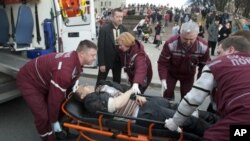A powerful bomb exploded in a Minsk subway station on Monday, killing 11 people and wounding 126 others.
The underground bomb exploded during rush hour in the Belarussian capital, cutting into two trains filled with evening commuters at the system’s only transfer station.
Belarussian television images from the station showed smoke-filled subway cars with their windows blown out as firefighters carried black plastic body bags. Rescue workers picked their way down a shattered escalator and across a blood stained platform.
A commuter interviewed by Belarussian TV described how she had escaped Oktyabrskaya station by keeping quiet and not panicking. She said she made it through the smoke to the subway station exit.
Above ground, traffic in central Minsk was closed as first aid workers bandaged dazed commuters on stretchers, some with blood running down their faces. Smoke rose out of the station, which is located about 100 meters from the offices of Belarus President Alexander Lukashenko. The president visited the scene and gave reporters the death toll.
Deputy Prosecutor Andrei Shved told reporters at the scene that the bombing was an "act of terror" and that a criminal probe has been opened. Terrorism is rare in Belarus, a tightly policed country of some 10 million people with a high degree of religious, racial and linguistic uniformity.
But the political mood soured sharply after elections last December. President Lukashenko brushed aside widespread criticisms of vote fraud and claimed victory. When protesters marched through the center of Minsk, past Oktyabrskaya station to the president’s offices, riot police arrested 700 demonstrators, including seven rival presidential candidates.
Since then, hundreds of Mr. Lukashenko's political opponents have fled into exile in Poland, Lithuania and the Czech Republic. Several detainees who were released gave reporters graphic accounts of what they called torture at the hands of Belarus security forces.
Hours before Monday's subway blast, Belarus authorities announced the closing of two opposition Internet Websites. In the only other major terrorist incident in recent years, about 50 people were injured when a bomb exploded in 2008 at a concert attended by Mr. Lukashenko in Minsk. No arrests were ever reported.
Russia has been hit during the past two years by a series of terrorist bomb attacks. On March 29 of last year, two female suicide bombers killed 40 people and wounded dozens of others during the morning rush hour on the Moscow subway. In January of this year, a suicide bomber killed 37 people at Moscow's busiest airport.
Last month, Doku Umarov, the man who claimed responsibility for those attacks, survived an air strike on his encampment in southern Russia's Caucasus mountains. Umarov, Russia’s most wanted Islamist rebel, vowed revenge in an audiotape released last week.
Russia and Belarus are united in a customs union and travel between the two countries is visa free.
Eleven Dead, Scores Injured in Belarus Subway Blast
- By James Brooke




